
Why is rethinking necessary?
We contend that rethinking is necessary because local government revenues have not remained aligned with modern economic realities. We will show that this contributes to distortions in the economy and unfairness in how taxpayers are treated. Let’s consider the quintessential local government revenue: the property tax. The changing economy has challenged the relevance of the property tax. Most fundamentally, a large part of the value created in the modern economy does not involve property—it often involves less tangible things, like financial instruments or bits and bytes. For example, from 1989 to 2019, the top five fastest-growing categories of wealth held by families were types of financial instruments. This has changed the relative importance of assets in the composition of family wealth. Financial assets increased as share of total assets, from 31% to 42%. The relative share of wealth derived from primary residences and equity in nonresidential property both decreased. In short, wealth has become less connected with real property ownership and therefore does not represent the taxpayer’s ability to pay in the same way it used to.
What's inside the report:
- What is the scale of the problem?
- Can’t local governments just spend less?
- Where does local government revenue come from now?
- Where does the Rethinking Revenue initiative go from here?
About the Rethinking Revenue Initiative
The Rethinking Revenue initiative is a joint project of many organizations that have an enduring interest in creating thriving local communities and making sure that those communities are served by capable and ethical local governments. Rethinking Revenue is about providing local governments with the ability to raise enough revenues for the services their communities need—and to raise those revenues fairly and in a way that is consistent with community values. This first report from Rethinking Revenue is about defining the problem that local government revenue systems face. As the famed inventor Charles Kettering said, “a problem well stated is a problem half-solved.” The Rethinking Revenue initiative will follow this report with suggestions grounded in proven approaches to reform local government revenue systems.
The Rethinking Revenue initiative is a collaborative effort involving:
- American Planning Association (APA).
- Government Finance Officers Association (GFOA).
- International City/County Management Association (ICMA).
- National Academy of Public Administration (NAPA) Center for Intergovernmental Partnerships.
- National League of Cities (NLC).
- Center of Municipal Finance at the University of Chicago’s Harris School of Public Policy.
- Government Finance Research Center at the University of Illinois at Chicago’s College of Urban Planning and Public Affairs.
Learn more about the Rethinking Revenue initiative.
